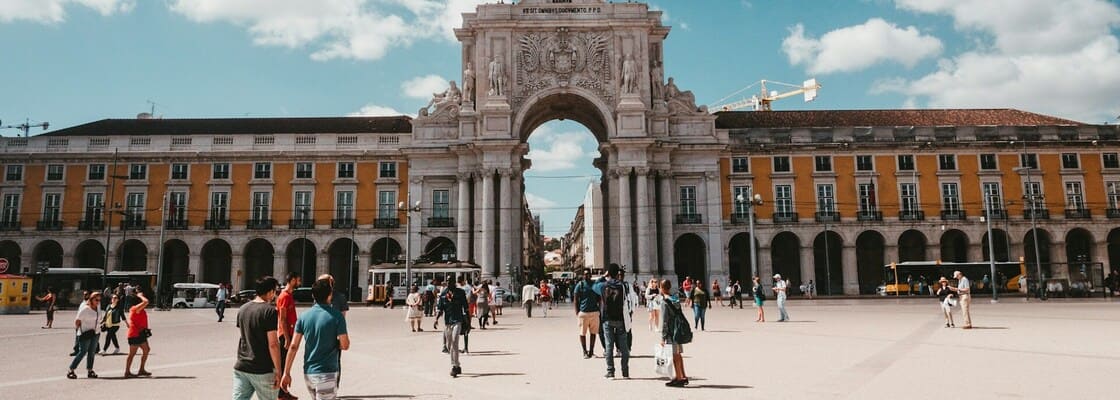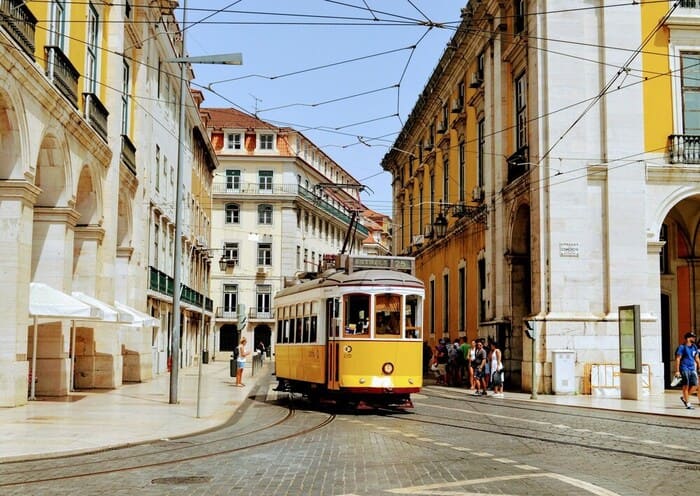Lisbon, Portugal’s charming capital, has cemented itself as one of the most exciting cities in Europe, fast becoming the location of choice for expats and investors from across the world. The array of advantages to living in Lisbon—the balmy climate, incredible gastronomy, and high quality of life—are just a few of the reasons why expats have come to call Lisbon home.
The luxury market here is also blossoming, with locations such as Avenida da Liberdade and Príncipe Real particularly appealing. In this article, we’ll explore this sought-after international city and weigh the pros and cons of living in Lisbon. We’ll delve into key reasons to consider living here, introduce the top neighborhoods to consider, and provide practical information to make the move as stress-free as possible.
Top Reasons to Consider Living in Lisbon

From the captivating Lisbon city center to coastal areas like Cascais nestled along the shores of the Atlantic Ocean, Lisbon is one of the best major European cities that offers expats an affordable, high-quality, thriving environment to relocate to. Retirees, families, or digital nomads searching for a fresh start might consider moving to Lisbon, Portugal, for the city’s cosmopolitan vibe, rich history, and laid-back pace of life. Below are some of the key reasons why expats are increasingly moving to Lisbon, whether it’s the incredible weather, delectable cuisine, or high quality of life.
Outstanding business location
Lisbon has emerged as a thriving business hub, attracting entrepreneurs and businesses to its shores, perhaps fueled by Web Summit’s relocation to the Portuguese capital in 2016.
The city’s strategic geographical location within Europe makes it a gateway for international trade and investment. With its excellent infrastructure in the cosmopolitan center and a modern business ecosystem, Lisbon offers a dynamic environment for startups, tech companies, and international companies to flourish.
Many co-working spaces are popping up across the city, plus several incubators and accelerators, further enhancing the city’s appeal to those seeking a vibrant business community or who are looking to set up a start-up in Europe.
Safe and tolerant
Lisbon is renowned for its safety and inclusivity. Portugal ranked 7th in the 2023 Global Peace Index and has very low crime rates. Legislation is also generally progressive, another key selling point for expats looking to relocate.
You’ll also find that English is widely spoken, particularly by the younger generation, with Portugal ranking in 8th position on the 2023 English Proficiency Index. However, picking up some basic Portuguese and even learning to speak Portuguese fluently can be advantageous. Plus, Portuguese people are generally very friendly and go out of their way to help you, whether it’s pointing you in the right direction to the post office or providing top restaurant recommendations.
Sublime climate and world-class beaches
Lisbon boasts a Mediterranean climate characterized by mild winters and warm, dry summers. Proximity to the Atlantic means that the city never becomes stiflingly hot in the summer months.
The city’s delightful weather allows for an outdoor lifestyle throughout the year, encouraging residents to explore its charming parks and picturesque neighborhoods. Moreover, Lisbon is situated near stunning beaches, such as Praia de Santo Amaro bordering Oeiras west of Lisbon and Praia da Rainha in Cascais, providing easy access to beautiful coastal landscapes. Watersport fanatics will be able to get their fix throughout the year. If you are into golf, Lisbon is a prized location, with over 20 top-quality golf courses in the Lisbon area.
High quality of life
Effortlessly blending contemporary design with traditional architecture, Lisbon fully embraces its historical charm while looking to the future. With a low cost of living that certainly doesn’t compromise on quality, Lisbon – as is the case for Portugal in general – provides a haven for residents to enjoy their day-to-day lives to the fullest.
With countless parks scattered around the city, a range of family-run local eateries and international restaurants, and proximity to fabulous beaches and the Sintra-Cascais Natural Park, it is easy to live a high quality of life in one of the most charming European capitals.
Portugal boasts some of the best wines in the world. Due to its long coastline, seafood is particularly good here, alongside incredible meat dishes that pair wonderfully with a good red Douro wine.
Potential Cons of Living in Lisbon
Portugal is an amazing country to live in. Still, despite its vibrant culture, welcoming nature of Portuguese nationals, delicious food, great weather, and beautiful beaches, there are always cons to consider when relocating to a new country. Below, we offer a few of the cons to weigh against the top reasons to consider living in Lisbon, Portugal, which we discussed in the previous sections.
Portuguese salaries living in Lisbon
One potential disadvantage of living in Lisbon is the relatively low local salaries compared to other major European cities, the USA, and the UK. According to Numbeo, in 2024, the average salary in Lisbon, Portugal, after taxes, is €1,211.39 per month, while in Spain’s capital city of Madrid, average monthly salaries stand at €2,315.52. However, Lisbon, Portugal, offers a more affordable cost of living compared to most European cities, so depending on where you live and your lifestyle, your salary can go a lot further.
High rental costs living in Lisbon
Compared to other Portuguese cities like Porto and the Algarve region, apartments in Lisbon are pricier, especially in the big city center. However, with more expats and digital nomads expressing interest in living in Lisbon, the Portuguese capital’s real estate market makes finding affordable apartments for rent tricky. You can find cheaper rental apartments in the outer districts of Lisbon, Portugal, and still enjoy city life and the pleasant climate surrounded by open green spaces and easy access to all the major villages. We advise you to seek expert advice as it will help you effortlessly navigate Lisbon’s real estate market.
Language barrier living in Lisbon
Living in Lisbon, you will find English widely spoken, and the language barrier should not be much of a problem in daily life. However, it is a good idea to learn Portuguese as this can come in handy, particularly for bureaucratic processes and will also make your transition to Portuguese life much easier.
Key Neighborhoods

Choosing where to live in Lisbon and the Greater Lisbon Metropolitan Area will depend on your lifestyle preferences. Whether you seek tranquility in a quiet neighborhood or the vibrant energy of neighborhoods that host regular cultural events and live music venues closer to the center, Lisbon offers a diverse range of options. Families may prioritize proximity to schools, while digital nomads might prefer somewhere closer to the buzzing center.
If you are looking for a quiet retreat, then Estrela and Campo de Ourique will be to your liking, while if you are looking for a historic part of the city, then Alfama and Graça should be on your radar. Arroios and Avenidas Novas are more practical areas where you can easily get around the city, plus have access to charming parks. Then you have Parque das Nações, which is unlike anywhere else in the city, with its modern, futuristic buildings and cutting-edge restaurants spilling out onto the street.
Additionally, for luxury buyers, neighborhoods like Avenida da Liberdade, Lapa, and Chiado are highly desired for their upscale amenities and premium real estate options, offering a sophisticated and lavish living experience in Lisbon.
What is the cost of living in Lisbon?

Portugal is one of the most affordable countries in other Western European cities. According to Numbeo, consumer prices in Lisbon are 5.8 percent lower than in Spain’s capital city, Madrid. Although the cost of living will vary considerably depending on your lifestyle, you will be pleasantly surprised by its affordability. Take healthcare, for example, which is considerably less expensive than it would be in the USA. However, bear in mind that Lisbon is pricier compared with other parts of the country. Dinner at a mid-range restaurant and grocery shopping won’t break the bank. At the same time, transportation in Lisbon is very affordable, particularly if you opt for a city monthly pass, which costs just €40. However, if you prefer to live in the upmarket neighborhoods of like Avenida da Liberdade and Principle Real, which offer a thriving cafe culture and international designer stores, prepare to pay more for rental apartments and other living costs.
Practical Information about Living in Lisbon

Moving to a new city can be challenging. Here, we provide practical information that will come in handy if you are considering moving to Lisbon.
Schools
You will find a wide array of international schools in Lisbon, with many different curricula and languages to choose from, including the American system, British system, and French curriculum. There are eight international schools in Lisbon and 20 in the Greater Lisbon Area. If you are interested in brushing up on your Portuguese, there is also a great selection of Portuguese language schools that you can enroll in.
Healthcare
Healthcare is generally very good in Portugal, with public healthcare available to residents at minimal cost through Portugal’s National Health Service (SNS). Private medical insurance is also an often-favored option for expats and can be found at an affordable cost compared to the United States and other Western European countries. You will be able to see a specialist quicker with private health insurance.
Transportation
Like other European capitals and major cities, Lisbon’s extensive metro, bus, and tram systems allow quick and easy travel. Trains can also quickly take you around the country, while Lisbon International Airport offers flights to Europe, Africa, the Americas, and Asia.
Festivals and attractions
In Lisbon, you’ll be able to enjoy festivals throughout the year, from the lively Santo António Festival to summer jazz festivals. There is also an array of museums and art galleries where you can get your culture fix. At night, the city comes alive with a booming nightlife fueled by hip bars and swish nightclubs. Many renowned international musicians drop by Lisbon to perform in the capital, and there are several top international festivals in the summer months, such as Nos Alive, Super Bock Super Rock, and MEO Kalorama, attracting top artists from across the world.
Shopping
Lisbon’s shopping scene caters to diverse tastes. The historic Baixa district hosts high-end boutiques, while the trendy Chiado area is a hub for fashion enthusiasts. For authentic souvenirs, explore the vibrant markets like Mercado da Ribeira. You’ll also find several food markets scattered around the city, where you can find incredible fresh produce.
The Bottom Line on Living in Lisbon, Portugal

Each person will have their reason for moving to or investing in Lisbon, whether it’s the high quality of life, warm weather, high-quality healthcare, excellent international schools – or a combination of factors. Plus, the real estate market has experienced massive growth in recent years, with high yield potential if planned correctly. If the luxury market is what interests you, there is a wide array of luxury properties, from swish modern apartments to spacious houses with waterfront views.
Frequently Asked Questions About Expat Living in Lisbon
Is Lisbon a good place to live in?
Families, young professionals, and investors from all walks of life are drawn towards this captivating city’s vibrant culture, rich history, and high quality of life. Depending on your personal requirements and preferences, living in Lisbon as an American or any non-EU expat is a more affordable option compared to other European capital cities, and the city’s warm and welcoming community and sublime climate make the Portuguese capital city one the best places to live in Western Europ.
Is Lisbon safe?
Lisbon is considered a safe city for residents and tourists. Compared to other European countries, Portugal has a reputation for being one of the safer countries on the continent and ranks 7th on the 2023 Global Peace Index.



